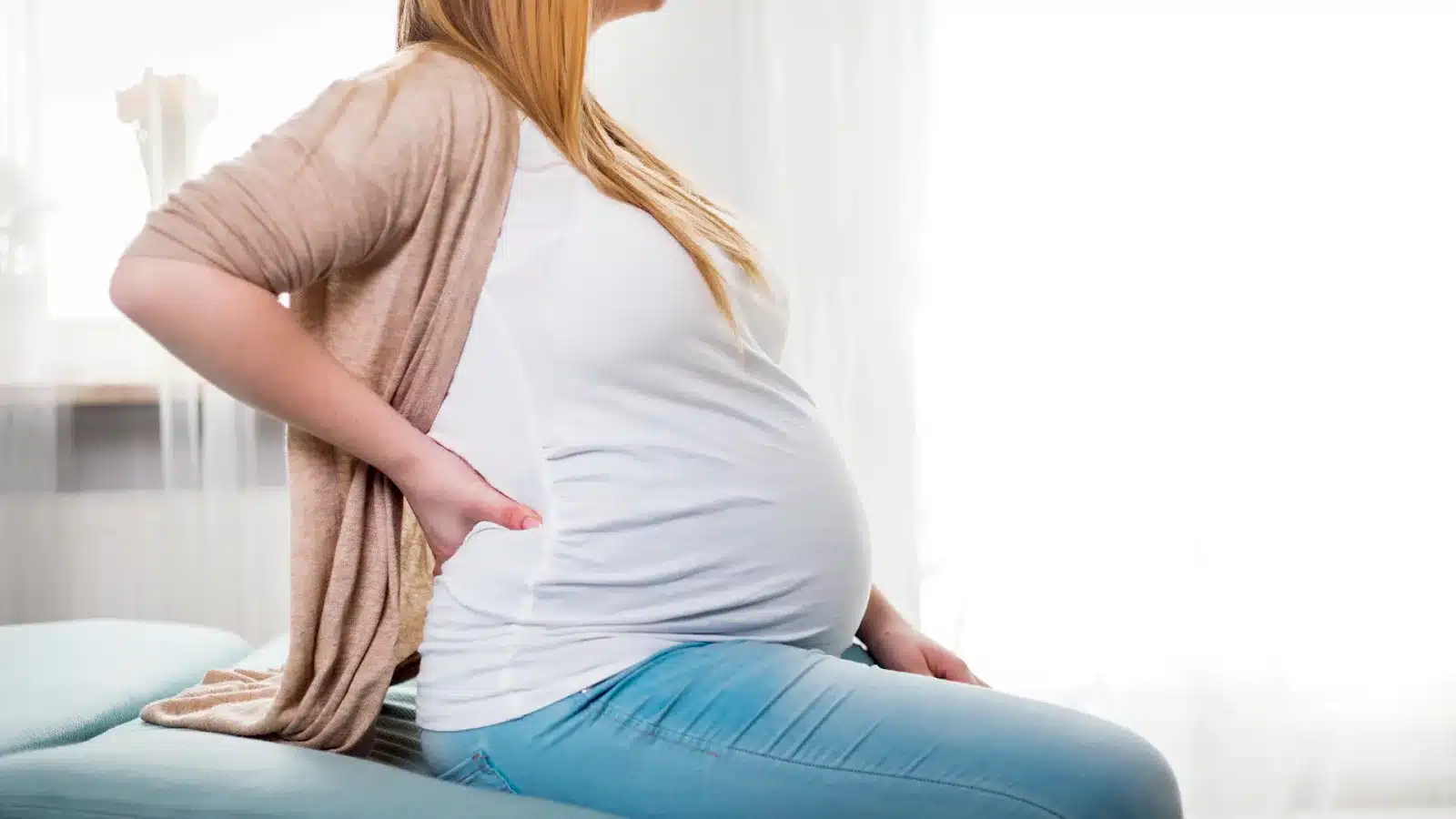Diarrhea During Pregnancy: Causes and Remedies

You’re a few days away from your expected period and suddenly notice your digestion feels off, more urgent bathroom runs, looser stools, and a general sense of “something’s different.” It’s natural to wonder: “Could this mean I’m pregnant?”
Pregnancy can bring about a lot of changes, some exciting, some unexpected. While tender breasts, fatigue, and morning nausea often steal the spotlight in early pregnancy conversations, digestive shifts like diarrhea tend to fly under the radar. But they happen.
While not as common as nausea or fatigue, diarrhea can occur in early pregnancy, often due to hormonal changes, dietary shifts, or increased sensitivity to food. Knowing what’s normal and when to pay closer attention can bring a little peace of mind.
What this guide will support you with:
- Diarrhea during pregnancy is often linked to hormone changes, increased gut sensitivity, or sudden diet shifts.
- Common triggers include prenatal vitamins, food intolerances, new eating habits, or stress.
- Safe remedies like staying hydrated, eating bland foods, and avoiding known irritants can bring relief.
- Preventive tips like eating gentle, fibre-balanced meals and making slow dietary changes can help avoid flare-ups.
- If symptoms are severe, frequent, or accompanied by dehydration or cramping, it’s best to contact your doctor.
What Causes Diarrhea During Pregnancy?

Digestive changes can happen even when you’re eating well, staying hydrated, and doing everything “right.” It’s one of those unexpected shifts that can leave you wondering: is diarrhea a sign of pregnancy? While not the most talked-about symptom, diarrhea does show up for some women in the early weeks.
Here are the most common causes:
1. Hormonal Changes
Pregnancy hormones, especially progesterone, estrogen, and hCG, begin rising quickly after conception. These shifts can affect how your digestive system works. While progesterone is known to slow digestion, for some people, it causes the gut to move unpredictably, leading to looser stools or more frequent bowel movements.
2. Dietary Shifts and Food Sensitivities
Maybe you’ve started eating more fibre, swapped out caffeine, or found yourself reaching for certain cravings. Even small changes in your diet can trigger reactions in a sensitive gut, especially early on when your body’s adjusting.
Some common pregnancy-related triggers include:
- Spicy or greasy foods.
- New fruits or veggies are introduced suddenly.
- Lactose or gluten sensitivity surfacing for the first time.
3. Prenatal Vitamins and Supplements
Prenatal vitamins are essential, but some of their ingredients, particularly magnesium or vitamin C, can cause loose stools or mild digestive upset. Others, like iron, may cause constipation for some but diarrhea in others. It’s all about how your body responds.
If you think your vitamin might be the cause, talk to your provider; they may suggest switching brands or adjusting the dose.
4. Infections or Illness
Not every case of diarrhea is pregnancy-related. You may have caught a stomach bug, eaten something that didn’t sit well, or picked up a mild foodborne illness. If symptoms are sudden, severe, or include fever or vomiting, it’s a good idea to rest, hydrate, and check in with your doctor if needed.
5. Stress and Emotional Upset
Pregnancy brings a mix of feelings: joy, anticipation, worry. Your emotional state can absolutely affect your gut. Stress hormones like cortisol can trigger digestive upset, including diarrhea. Your body feels everything, especially during this time of change.
How to Manage Diarrhea During Pregnancy at Home

When diarrhea shows up during pregnancy, it can feel frustrating, even a little unsettling. But in many cases, simple at-home care can bring relief and comfort without medical intervention. Here’s how to support your body gently and safely:
1. Rest and Reset Your System
Diarrhea can leave you feeling depleted, physically and emotionally. Give your body space to recover by slowing down, resting often, and letting go of non-urgent tasks. Creating a calm routine can also support your gut.
- Deep breathing or meditation
- Warm showers
- Listening to soft music
- Cuddling under a blanket with a warm drink
2. Eat Soothing, Bland Foods
Stick to easily digestible meals. The BRAT diet, bananas, rice, applesauce, and toast, can help firm up stool and soothe your stomach. Small, frequent meals are easier on your gut than large portions.
Additional safe options may include:
- Plain crackers
- Boiled potatoes
- Steamed carrots
- Oatmeal or cream of rice
Avoid spicy, greasy, or dairy-heavy foods until things settle.
3. Stay Hydrated, Slow and Steady
Sip water throughout the day instead of drinking large amounts at once. You can also try:
- Coconut water (a natural source of electrolytes)
- Clear broths
- Diluted apple juice or oral rehydration solutions
Ask your provider before using any electrolyte drink with added sugar or sodium.
4. Use a Warm Compress for Relief
If you’re experiencing mild cramping or belly discomfort, a warm (not hot) compress can bring soothing relief. Place it gently on your abdomen while resting; it can help relax tense muscles and ease bloating.
Note: If diarrhea doesn’t improve within 1–2 days, or if symptoms worsen, it’s time to check in with your healthcare provider. Home remedies are a good first step, but you never have to manage it all alone.
How to Prevent Diarrhea During Pregnancy
While diarrhea during pregnancy can feel unsettling, there are simple, protective steps you can take to reduce your chances of getting it. Many cases come from preventable causes like infections or foodborne illness, so a little mindful care can go a long way in keeping both you and your baby safe.
1. Wash Your Hands Thoroughly Before Every Feeding
Keeping your hands clean is one of the most effective ways to avoid germs that may trigger diarrhea. A gentle reminder to:
- Wash with soap and water for at least 20 seconds.
- Especially after using the bathroom, changing diapers, handling food, or caring for someone who’s sick.
- Don’t forget to wash up after taking out the trash, too.
If soap and water aren’t available, hand sanitizers with at least 60% alcohol are a safe alternative.
2. Eat Fully Cooked Food and Drink Safe Water
Food safety becomes even more important during pregnancy. You’re not just nourishing yourself, you’re supporting your baby’s development, too. To avoid foodborne illnesses that can cause diarrhea:
- Cook meat, fish, and shellfish thoroughly, make sure they’re hot and fully done
- Store and handle food properly to prevent contamination
- Avoid undercooked, raw, or questionable food items when in doubt.
If you’re traveling or staying in an area with limited sanitation or water quality, be extra cautious. Consider these gentle safeguards:
- Drink only bottled water, including for brushing your teeth or making ice.
- Choose factory-sealed beverages.
- Peel raw fruits and veggies or wash them in clean, filtered water before eating.
These simple precautions can help protect your digestive system while supporting your overall well-being.
When Diarrhea Needs Medical Attention During Pregnancy

Most of the time, diarrhea during pregnancy is short-lived and resolves on its own. But if it lingers or feels more intense than usual, it’s worth paying closer attention, especially when you’re pregnant and every signal from your body matters a little more.
Here are some signs that it may be time to call your healthcare provider:
- It lasts more than 48 hours: Occasional loose stools aren’t uncommon, but if diarrhea continues beyond two days, it may be due to an infection, food sensitivity, or something else that needs treatment.
- You’re showing signs of dehydration: Frequent diarrhea can quickly deplete fluids. Watch for dry mouth, dizziness, dark yellow urine, or going to the bathroom less often.
- There’s blood, mucus, or a high fever: These symptoms may indicate an infection or inflammation that needs medical care. Don’t wait it out, call your provider right away.
- You feel severe or persistent cramping: Mild tummy discomfort can happen, but if you’re having strong cramps that don’t ease up, or are paired with diarrhea, back pain, or contractions, it’s important to check in.
- There’s a risk of preterm labor (rare but possible): Especially in the third trimester, intense digestive distress or infection could (rarely) trigger uterine activity.
- You suspect an underlying condition: Diarrhea that keeps returning or doesn’t improve could be linked to something more chronic, like food poisoning, IBD (inflammatory bowel disease), thyroid issues, or gut sensitivities.
Remember: it’s always okay to call your provider, even if you’re just feeling unsure. Pregnancy is full of changes, and seeking support early can give you peace of mind and protect your health and your baby’s.
Final Words
If you’re dealing with diarrhea during pregnancy, know this: you’re not alone, and it’s not a sign that something is wrong. Your body is doing the extraordinary work of adjusting, shifting, and protecting the new life within you.
Yes, this part can be messy and uncomfortable, but it’s just one stretch of the journey, not the whole story. Relief is possible, and there’s no shame in reaching out. Sometimes, just one kind conversation away!
FAQs
1. Is diarrhea a normal symptom of early pregnancy?
While not one of the most common signs, some women do experience digestive changes, including diarrhoea, in early pregnancy. It’s usually mild and short-lived, often due to hormonal shifts or dietary changes.
2. How can I tell if my diarrhea is pregnancy-related or something else?
If your diarrhea is accompanied by other early pregnancy symptoms (like fatigue, sore breasts, or missed periods), it could be related. But if it’s severe, includes blood, or lasts more than 2–3 days, it’s best to speak with your provider to rule out infections or other causes.
3. Can diarrhea harm my baby?
Mild diarrhea isn’t harmful to your baby. However, prolonged or severe diarrhea can lead to dehydration, which may pose risks during pregnancy. Staying hydrated and seeking care if symptoms worsen is important.
4. What are safe remedies for diarrhea during pregnancy?
Drinking fluids, resting, and switching to a bland, gentle diet (like bananas, rice, applesauce, toast) can help. Always talk to your OB-GYN before taking any over-the-counter medications, including anti-diarrheals.
5. When should I call my doctor about diarrhea during pregnancy?
Call your doctor if:
- Diarrhea lasts more than 48 hours
- You notice signs of dehydration (dark urine, dry mouth, dizziness)
- There’s blood in your stool or a high fever
- Abdominal pain becomes severe
Trust your instincts, if something doesn’t feel right, reaching out is always a good idea.
6. Can prenatal vitamins cause diarrhea?
Yes, certain formulations, especially those with high magnesium or iron content, can affect your digestion. If you suspect your prenatal vitamin is the cause, discuss alternatives with your doctor.










